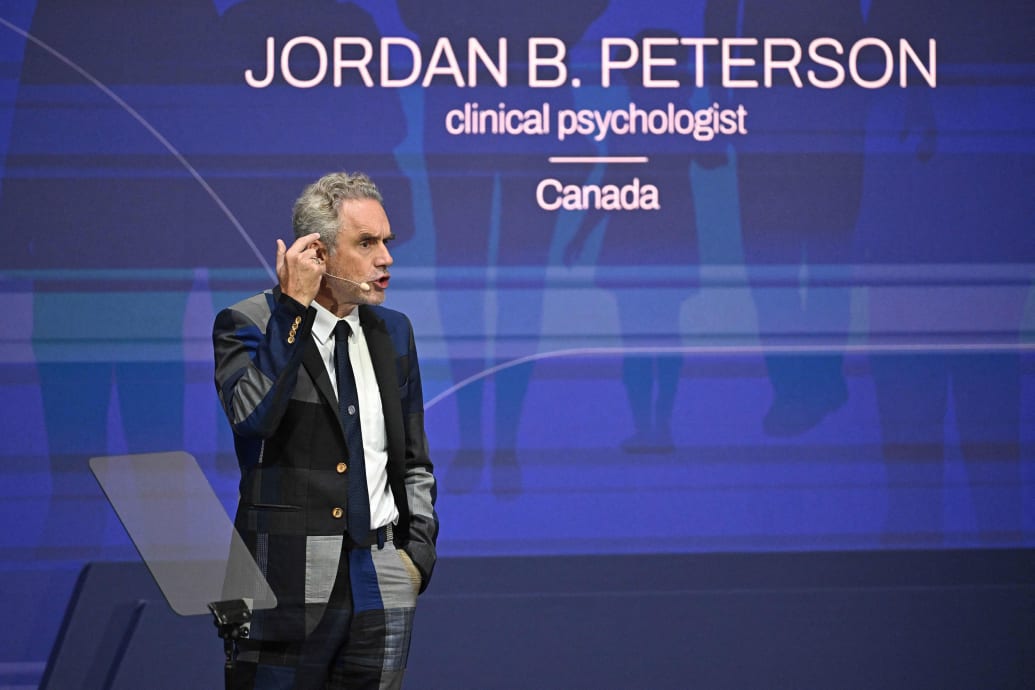Jordan Peterson’s Astounding Ignorance on Russia and Ukraine
Peterson #Peterson

Last week, the psychologist and right-wing pundit Jordan Peterson appeared on Piers Morgan’s Sky News show to discuss the war in Ukraine. Peterson declared that “We had a chance, especially in the ’90s and in the 2000s, for that matter, to make a long-standing peace with Russia… and we burned up that opportunity like the fools that we are.”
To Peterson, Vladimir Putin isn’t the one primarily responsible for two years of pointless, grinding war in Ukraine—rather, he blames the “military industrial complex” which has conjured an image of Russia as the “dire enemy of the West.”
Peterson has been making arguments like these for years. A few months after Russia invaded, he published an essay in the Daily Wire titled “Russia Vs. Ukraine Or Civil War In The West?” It hasn’t aged well.
For example, he wrote, “I firmly expect oil prices to hit $300 a barrel, or worse, in the upcoming year or two.” It has been almost two years since the war began, and oil prices are hovering in the low to mid-$70 range (prices never rose above where they were when Peterson published his essay). He said the “ruble is doing just fine”—before the ruble plummeted by 40 percent. He expected Russia to use tactical nuclear weapons.
According to Peterson, the West is indifferent about what happens to Ukraine. “Remember the Holomodor?” he asked gravely (while mispronouncing the word) in a video version of the essay. “Do you even know what it was?”
It would be fair to ask if Peterson knows what the Holodomor was. References to Stalin’s terror famine cut against the argument that we should abandon Ukraine at a time when Russia has weaponized access to food by refusing to guarantee the safety of ships transporting grain in the Black Sea.
Jordan B. Peterson addresses the 5th Demographic Summit in the Fine Arts Museum in Budapest on September 14, 2023.
Attila Kisbendek/Getty Images
Peterson said he spent a month “carefully assessing” his essay with a “number of experts on foreign policy.” One of those experts was the University of Chicago’s John Mearsheimer, who believes the West is entirely responsible for the war and insists that nothing Putin has done in Ukraine could possibly be construed as imperialism. Like Mearsheimer, Peterson blamed Russian aggression on “NATO and EU expansionism.” He said Russia reasonably views Ukraine as a “necessary buffer between the Europe that has invaded Russia to terrible effect in 1812 and 1941.” He argued that Ukraine is “crucial” to Moscow but “irrelevant” to the West, except as an outlet for “shallow moral posturing.”
Peterson’s essay isn’t just an example of why self-help gurus and conservative culture warriors shouldn’t try their hand at geopolitical analysis. It’s one of the clearest articulations of why the nationalist right is increasingly sympathetic to illiberal autocrats who make the right noises about tradition and faith, and it’s worth revisiting as right-wing support for Ukraine collapses.
If Peterson turns out to be right about Western “indifference” to Ukraine (the $75 billion Washington has sent to the country doesn’t look very indifferent), he’ll have to interrogate his own political allies to figure out why. The vast majority of Democrats certainly aren’t eager to abandon Kyiv, unlike many populists in the GOP and nationalist intellectuals.
After outlining his views on the origins and context of the war—which he appeared to adopt wholesale from Mearsheimer—Peterson got to the main point.
He believes the conflict is a “civil war in the West” because it pits degenerate secular societies like the United States against Russia, which is committed to upholding Judeo-Christian civilization against an onslaught of wokeness and postmodernism. There’s a whole class of commentators who view every political issue through the lens of the culture wars. But Peterson took this parochial fixation to its grandest scale yet: “The culture war is now truly part of why we have a war. And it’s a real war.”
Peterson often cites a famous line from Fyodor Dostoyevsky’s The Brothers Karamazov: “Without God, all things are permitted.” This idea reflects one of Peterson’s most fundamental political and moral convictions—secularism is always a path to totalitarianism and “hell.” To the extent that Western societies have moved toward irreligiosity (which they generally have), Peterson believes they’re on a path toward destruction. And he believes Russia is a God-fearing civilizational counterweight—never mind that church attendance is five times higher in the U.S. than it is in Russia.
In his essay, Peterson cited a compendium of articles by Dostoevsky titled A Writer’s Diary, in which the author “outlined his view of his homeland’s destiny, which he saw as crucially inseparable from Russia’s role in Christendom.”
According to Peterson, Dostoevsky “fervently believed in the necessity of a revival of Christianity… and he believed that the Russians would need to play a central role in that revival.” This is a “role” Peterson embraces today, even if the West’s spiritual and moral tutor in the Kremlin is a dictator responsible for slaughtering civilians everywhere from Aleppo to Bucha—and for launching the largest and most devastating European conflict since World War II.
Peterson finds Putin’s professed Christianity reassuring: “Putin himself is a practicing Christian…I certainly feel more comfortable knowing that Putin regards himself however indeterminately as subordinate to something beyond himself.”
The civilians who have been killed by indiscriminate Russian artillery strikes and the families of Ukrainian soldiers who’ve lost their lives or been maimed on the battlefield probably don’t derive similar comfort from Putin’s religious pretensions.
Peterson observed that Putin “frequently speaks of his country’s role as a bulwark against the moral decadence of the West,” and he doesn’t regard this as propaganda. Instead, he thinks Putin is on to something: “Are we degenerate, in a profoundly threatening manner? I think the answer to that may well be yes.”
He continued: “The idea that we are ensconced in a culture war has become a rhetorical commonplace. How serious is that war? Is it serious enough to increase the probability that Russia, say, will be motivated to invade and potentially incapacitate Ukraine merely to keep the pathological West out of that country, which is a key part of the historically Russian sphere of influence?”
“Peterson’s essay isn’t just an example of why self-help gurus and conservative culture warriors shouldn’t try their hand at geopolitical analysis. It’s one of the clearest articulations of why the nationalist right is increasingly sympathetic to illiberal autocrats who make the right noises about tradition and faith…”
Peterson then detailed an episode which he believes captures these Western “pathologies”—President Joe Biden’s nomination of Ketanji Brown Jackson to the Supreme Court. He spent paragraph after paragraph lambasting Biden’s declaration that he would appoint a Black woman to the court and railing against identity politics. He meandered through a thicket of other culture war arguments—he was particularly incensed that Jackson chose not to answer when asked to define the word “woman” during her confirmation hearings. “I’m not a biologist,” she said. According to Peterson, this answer was an “indication of Western derangement”—just the sort of thing Putin stands against.
Peterson isn’t the only conservative pundit whose attitude toward culture war issues like identity politics pervades his views on foreign policy. Peterson’s colleague at the Daily Wire, Matt Walsh, believes the U.S. military has been captured by wokeness—which is why “Putin doesn’t fear us.” Walsh also admires some of Russia’s social policies and says he “couldn’t care less about Ukraine” (Peterson should take note: that’s what indifference looks like).
Putin has explained his reasons for waging war on Ukraine ad nauseam, and they don’t include Biden’s Supreme Court pick or the “woke” U.S. military. In a 7,000-word essay titled, “On the Historical Unity of Russians and Ukrainians,” Putin argued that Ukraine isn’t a real state and Russia has every right to absorb it. He invaded and annexed Crimea seven years before Biden took office. He described the collapse of the Soviet Union as the greatest geopolitical catastrophe of the 20th century, and he has always been obsessed with the restoration of Russian power.
Peterson is relieved that Putin claims to be a believer, unlike Stalin. He fails to acknowledge that Putin has been engaged in a long campaign to revive Stalin’s legacy—not because he misses communism, but because he misses the days of Russian domination and empire.
“I cannot see how we can defeat the Russians, in any real sense,” Peterson warns. So he believes Ukraine’s allies should abandon the war effort and consider the following options: “Perhaps the declaration of Ukraine as a neutral state for a minimum period of twenty years. Perhaps a new election in Ukraine subject to ratification by joint Russian-Western observers. Perhaps a pledge on the part of the West to not offer to Ukraine any membership in NATO or the EU that is either not simultaneously offered to Russia or moving forward on terms acceptable to Russia.”
In other words, perhaps it’s time for a total surrender to Putin. For Peterson, there’s no space for democracy or self-determination in Ukraine. The idea of Russian observers “ratifying” a Ukrainian election is farcical—Russia has already held fake elections in the parts of Ukraine it has stolen, and real democracy doesn’t exist under Putin.
But defeatism and ignorance are far from the ugliest aspects of Peterson’s position. “This civil war in the West,” he says, “can only be won on the intellectual or even the spiritual front.” In this “civil war,” Peterson clearly believes Russia is on the right side. It doesn’t matter that Putin is a corrupt autocrat with utter contempt for democracy and liberalism who has massacred tens of thousands of people to satisfy his vain imperial ambitions.
For pundits like Peterson, superficial piety, anti-wokeness, and opportunistic traditionalism are enough to make a vicious dictator the savior of the West.
